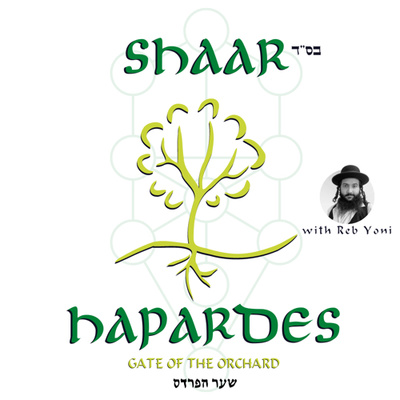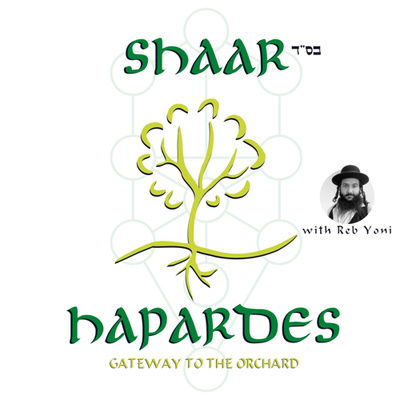
Shaar HaPaRDeS - Gate of the Orchard with Rabbi Yoni
By Rabbi Yoni
Tune in and hear the machshavos of Rabbi Yoni, integrating both yeshivish and chassidishe kabbalistic traditions to provide a holistic approach to connecting to HaShem in an intimate relationship. Experience frum hashkafa and inspire your neshama. Welcome to the life of a chassid.
*This podcast has been discontinued as of August 15, 2022. Thank you for your listener-ship. We’d love to keep you listening with us; to get future updates from Rabbi Yoni, please subscribe to his new podcast, The Emunity Podcast with Rabbi Yoni, at anchor.fm/rabbiyoni or visit rabbiyoni.org to learn more.*
*This podcast has been discontinued as of August 15, 2022. Thank you for your listener-ship. We’d love to keep you listening with us; to get future updates from Rabbi Yoni, please subscribe to his new podcast, The Emunity Podcast with Rabbi Yoni, at anchor.fm/rabbiyoni or visit rabbiyoni.org to learn more.*

Shaar HaPaRDeS - Gate of the Orchard with Rabbi YoniJun 21, 2018
00:00
02:41

Episode 179: Conclusion
It’s the end of an era. This is the final episode of this podcast. Please subscribe to my new podcast, The Emunity Podcast with Rabbi Yoni, at anchor.fm/rabbiyoni. Thank you.
Aug 15, 202205:23

Episode 178: Mevatel the Klipa Noga
How does one handle the klipa noga with all the growth we’ve been working on?
Aug 08, 202211:36

Episode 177: Types of Love
Just as there are levels of fear, so too love.
Aug 01, 202211:16

Episode 176: Refined and Quiet
Let’s dive in to the middah of being quiet. Part of our bilvavi series.
Jul 25, 202212:10

Episode 175: Building Ratzon
Build your ratzon to have emunah.
Jul 18, 202213:27

Episode 174: Yiras HaOnesh
In Bilvavi, we look at yiras haonesh and its essential component to deveikus.
Jul 11, 202213:53

Episode 173: Levels of Yirah
In Bilvavi, we discover there are levels of yirah (fear).
Jul 04, 202209:30

Episode 172: Belief in Divine Providence
In Bilvavi, the concluding remarks on Divine Providence.
Jun 27, 202217:11

Episode 171: Perspective on Creation
Continuing in Bilvavi, one’s perspective on creation influences their belief in Divine Providence.
Jun 20, 202210:58

Episode 170: What place is there for anger?
Let’s eradicate anger - it’s proof we lack emunah.
Jun 13, 202212:58

Episode 169: 50 Levels & Anger Check
Post-Shavuos, what do we do now? Keep growing. Also, let’s use an anger check to gauge growth.
Jun 07, 202211:59

Episode 168: Sefirah of Malchus
This Sefiras Ha-Omer, let’s discuss simple inspirations to work on ourselves, not just count up. This week is Malchus.
May 30, 202206:59

Episode 167: Sefirah of Yesod
This Sefiras Ha-Omer, let’s discuss simple inspirations to work on ourselves, not just count up. This week is Yesod.
May 23, 202206:16

Episode 166: Sefirah of Hod
This Sefiras Ha-Omer, let’s discuss simple inspirations to work on ourselves, not just count up. This week is Hod.
May 16, 202210:14

Episode 165: Sefirah of Netzach
This Sefiras Ha-Omer, let’s discuss simple inspirations to work on ourselves, not just count up. This week is Netzach.
May 09, 202208:51

Episode 164: Sefirah of Tiferes
This Sefiras Ha-Omer, let’s discuss simple inspirations to work on ourselves, not just count up. This week is Tiferes.
May 02, 202213:45

Episode 163: Sefirah of Gevurah
This Sefiras Ha-Omer, let’s discuss simple inspirations to work on ourselves, not just count up. This week is Gevurah.
Apr 25, 202209:50

Episode 162: Sefirah of Chesed
This Sefiras Ha-Omer, let’s discuss simple inspirations to work on ourselves, not just count up. This week is Chesed.
Apr 18, 202213:16

Episode 161: Small Stuff & HaShem in the Picture
Do we have emunah with even the small things?
Apr 11, 202211:34

Episode 160: Words of Emunah & Shopping with HaShem
To foster emunah, it must permeate our very nature, every word and every action.
Apr 04, 202212:08

Episode 159: Kosher Vessels
How we kasher a kli is indicative of what we need to do to purify our own neshamos. Learn how.
Mar 28, 202211:00

Episode 158: Music is an Avodah
All music is Avodah. But what is that service aimed at, HaShem, or not-HaShem?
Mar 21, 202210:04

Episode 157: AMaLeK Within
We’re commanded to hate AMeLeK. Who is that today? Also, Chag Purim Sameach!
Mar 14, 202210:48

Episode 156: Simcha is an Avodah
Simcha, joy, is not a feeling - it’s an avodah. This Adar, practice this avodah…
Mar 07, 202209:39

Episode 155: Emunah, Bitachon, and Coronavirus
How to we balance our emunah, bitachon, and coronavirus? Let’s take a look to remind us of how we should approach it.
Feb 28, 202218:18

Episode 154: Taking Time to Reflect Emunah
We need to sit down and spend time thinking thoughts of emunah in our circumstances.
Feb 21, 202210:38

Episode 153: I’m Not in Control
Who runs the show, you or HaShem?
Feb 16, 202211:23

Episode 152: Actions of Emunah
Continuing in Bilvavi, we look at how emunah has necessary actions to it that are shy of bitachon.
Feb 07, 202211:32

Episode 151: Emunah in the Details
Emunah isn’t just for big stuff - it’s also for literally every moment of life. Everything is divine circumstances. We just need to learn to see it.
Jan 31, 202212:18

Episode 150: Fearing Aveiros
What does it mean to fear HaShem. Let’s see what the Bobover Ruv has to say, with a story about R’ Zisha.
Jan 26, 202211:10

Episode 149: (Super)Powers of Kedusha
You have sparks of Kedusha all over and around you. You leave them everywhere. Supercharge your impact on true Tikkun Olam!
Dec 20, 202109:43

Episode 148: Frequency in Recognition and Extending to the Self
As if our homework on recognizing the basics of creation wasn’t enough, now we cranking it to 11. We need to recall throughout the day, every day, and take if farther, too, if we truly want to be in sync with cleaving to HaShem.
Dec 13, 202111:25

Episode 147: The Subliminity of Chanukah
As a holiday wraps to a close, we review how to keep the inspiration through the coming year.
Dec 06, 202110:51

Episode 146: Renewal During the Days of Joy
It’s that time of renewal. Find an inspiration to recognize the renewal in your own neshama this Chanukah.
Nov 29, 202111:36

Episode 145: Who Created the Sky? You, HaShem, You Created the Sky.
We need to constantly return to the simple question and answers of creation to create a firm foundation of simple faith.
Nov 22, 202111:15

Episode 144: The Root Cause is Emunah
Continuing in Sefer Bilvavi Mishnah Evneh, we learn the simple emunah is the root cause of our growth with HaShem, and chas v’shalom, our distance.
Nov 17, 202108:58

Episode 143: Rebranding the Podcast
In this episode we discuss the rebranding of this podcast. Stay tuned and stay subscribed!
Nov 10, 202105:31

Episode 142: Bilvavi - Stop & See
Join Yoni on a short talking hisbodedus in the redwoods on recognizing the Creator.
Oct 27, 202111:46

Episode 141: Bilvavi - Simple Emunah
The key to defeating the Pharaoh in our soul is through simple emunah.
Oct 18, 202109:47

Episode 140: Bilvavi - The Pharaoh in our Soul
Torah narratives have many purposes. Within you is the potential of every avos and every rasha we find in our mesorah.
Oct 11, 202108:55

Episode 139: The Power of Speech
As we take a quick break from our current discussion on Bilvavi, we turn to look to the power of speech and how it affects our deveikus to HaShem.
Oct 04, 202109:59

Episode 138: Bilvavi - Below & Above
What we do here needs help from Above to come to fruition. So ask.
Sep 26, 202109:17

Episode 137: Bilvavi - Breaking Down the Stone
In this episode we continue learning Bilvavi and discuss creating the constant awareness that there is a Creator.
Sep 19, 202109:39

Episode 136: Yom HaKippurim & Removing the Schmutz
Join me as we prepare for Yom Kippur. Let’s take a refreshing view on our potential for this day of prayer and fasting.
Sep 12, 202110:17

Episode 135: Elul: Erev Rosh Hashanah
The last episode in this year’s Elul series, let’s find our starting point for closeness this Rosh Hashanah.
Sep 05, 202111:59

Episode 134: Elul: Purpose of Mitzvos
What is the purpose of mitzvos? What if every mitzvah had a reason, and they were all chok?
Aug 30, 202110:35

Episode 133: Elul: Focus on the Purpose of Life
What is the purpose of life? Deveikus. As David HaMelech said, closeness to HaShem is my good.
Aug 23, 202113:04

Episode 132: Elul: Closeness to HaShem
The King is in the fields. Now is the time to draw near.
Aug 16, 202113:25

Episode 131: The Beginning of Deveikus
Welcome to the month of Elul. The King is in the fields. So what do we do about it?
Aug 10, 202110:05

Episode 130: A Loving G-d, Part 2
We continue the conversation on how HaShem is loving, not hateful, and appreciates every mitzvah we do when it has the right devotion to it.
Aug 02, 202108:33